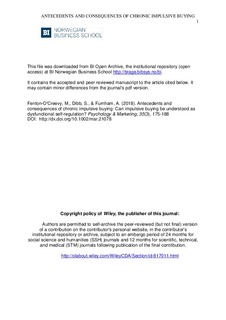Antecedents and consequences of chronic impulsive buying: Can impulsive buying be understood as dysfunctional self‐regulation?
Journal article, Peer reviewed
Accepted version
Permanent lenke
http://hdl.handle.net/11250/2500042Utgivelsesdato
2018Metadata
Vis full innførselSamlinger
- Publikasjoner fra CRIStin - BI [1015]
- Scientific articles [2181]
Sammendrag
Researchers reach different conclusions about the functional or dysfunctional nature of impulsive buying behavior. While many note the use of impulsive buying as a form of mood regulation, there is disagreement about whether this is functional or dysfunctional and the extent to which it causes financial harm. This paper draws on data from a U.K. national survey sample (N = 109,472) to contribute to these debates. Study results suggest that impulsive buying is more common for those who have most need to regulate mood and who have the least effective emotion regulation strategies. This suggests that impulsive buying may be understood as a failure of self‐regulation in relation to long‐term goals and as a strategy for mood regulation. Contrary to some prior claims in the retail management and marketing research literature, the study shows higher levels of impulsive buying to be associated with more adverse financial outcomes (which are not confined to the most extreme manifestations of the trait). While ineffective emotion regulation is associated with higher propensity to buy impulsively, the findings also suggest that effective emotion regulation may to some extent mitigate the adverse consequences of the propensity to buy impulsively. The implications for ethical management, research, and policy are considered.
